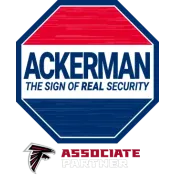Heard of the term "access control," but not sure what it means?
Here's a basic definition: A business access control system lets you control who enters your business, as well as where and when someone can enter or exit the building.
Decades ago, an access control system consisted of a receptionist and a simple sign-in sheet. But today's technological advances have created more secure and reliable systems using door readers, keypads and even biometric devices.
In this blog, we'll explain:
- The different types of business access control systems (and how they work)
- Why your business can benefit from an access control system
Looking to boost your building's security? We can install a custom access control system that perfectly fits your business's needs.
Types of access control systems (and how they work)
Access control systems vary depending on the type of authorization equipment you choose. The following are the 4 major types of authorization equipment used today:
- Key fob or access card
- Pin code or password with keypad
- Mobile apps with barcode or Bluetooth
- Biometric devices
Let's look at each of these types of authorization equipment in more detail.
Key fob or access card
The most basic form of access control is a key fob or access card, which are wallet-sized devices that have built-in authentication data inside them.
With this setup, you can install door readers at any access points you wish to control. You can give all of your employees a key fob/access card, and customize the access credentials for each employee.
For example, if you have a section of your office that deals with highly-classified and sensitive information, you can limit access to the specific employees who need to deal with that information.
Pin code or password with keypad
Instead of relying on physical objects like a key fob, many businesses opt for a "keyless" approach, such as a pin code or password.
With this approach, you can assign each employee a pin number or password that will grant them access to the areas they are authorized to enter. If an employee leaves the company or changes positions, you can easily promote or downgrade their access to your business.
Mobile apps with barcode or Bluetooth
With the advent of smartphones, more business owners are choosing a mobile access control system.
Some mobile access control systems use an app that employees must log in to and scan at a door to enter or exit the building. Other mobile access systems use Bluetooth technology, which allows employees to wave their phones in front of a sensor to enter/exit controlled areas.
With mobile access control systems, not only can you control the physical access points of your business, but you can also control who can access sensitive digital data. Using cloud-based technology, you can easily control which employees can access IT assets by sending them an identification number or code directly to their phone.
Biometric devices
For the most advanced access control, some business owners choose to install biometric devices. A biometric device consists of a scanner that has fingerprint or facial recognition software.
Whereas the other types of authorization equipment rely on what a person owns (key fob) or knows (pin number), a biometric device measures who a person is. These devices can almost instantaneously scan thousands of points on a person's face or fingertip to know who the person is, and what areas they are allowed to access.
Some companies that require high levels of security (like banks) use biometric devices in conjunction with another system for an advanced, 2-factor authentication process.
Why your business can benefit from an access control system
Installing an access control system comes with benefits such as:
- Easier control: As a business owner, you can easily revoke or add access privileges for your employees. Some systems allow you to do all of this from your smartphone.
- Increased security: With an access control system, you can program all of your doors to automatically lock after business hours. So, you don't have to worry about anyone accidentally forgetting to manually lock a door.
- Multi-location access: Have another campus or office building? An access control system will make it easy for managers or employees who travel from place to place.
- Faster emergency response: In the event of an emergency, you can quickly lock all access points to prevent theft or harm to employees. Reduced energy costs: Many access control systems can be synced to your building's HVAC and electrical system to automatically turn off lights or raise/lower the temperature after office hours.
- Full integration with your security system: Most access control systems will work with your existing security system, making it easier to control and secure all aspects of your business.
Interested in an access control system for your Atlanta business?
For over 50 years, Ackerman Security has been metro Atlanta's largest and most respected security company. Our highly-trained security technicians can help you design the perfect access control system for your business, based on your needs and budget.






